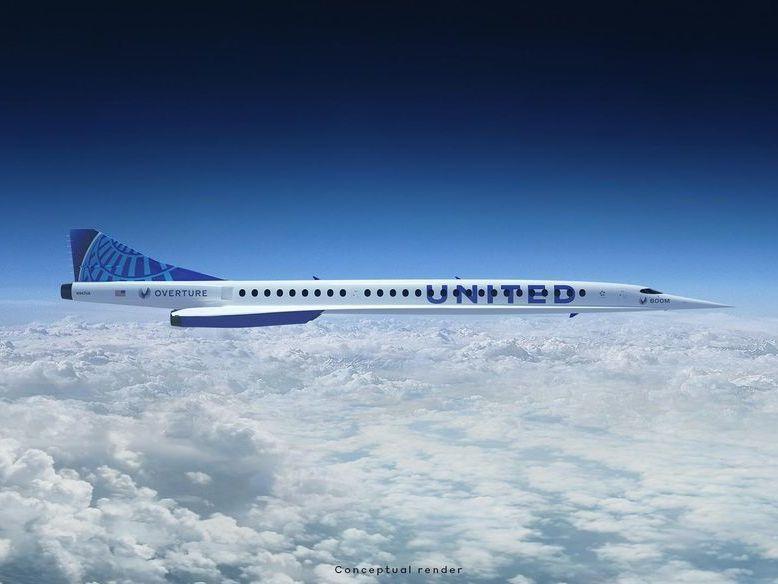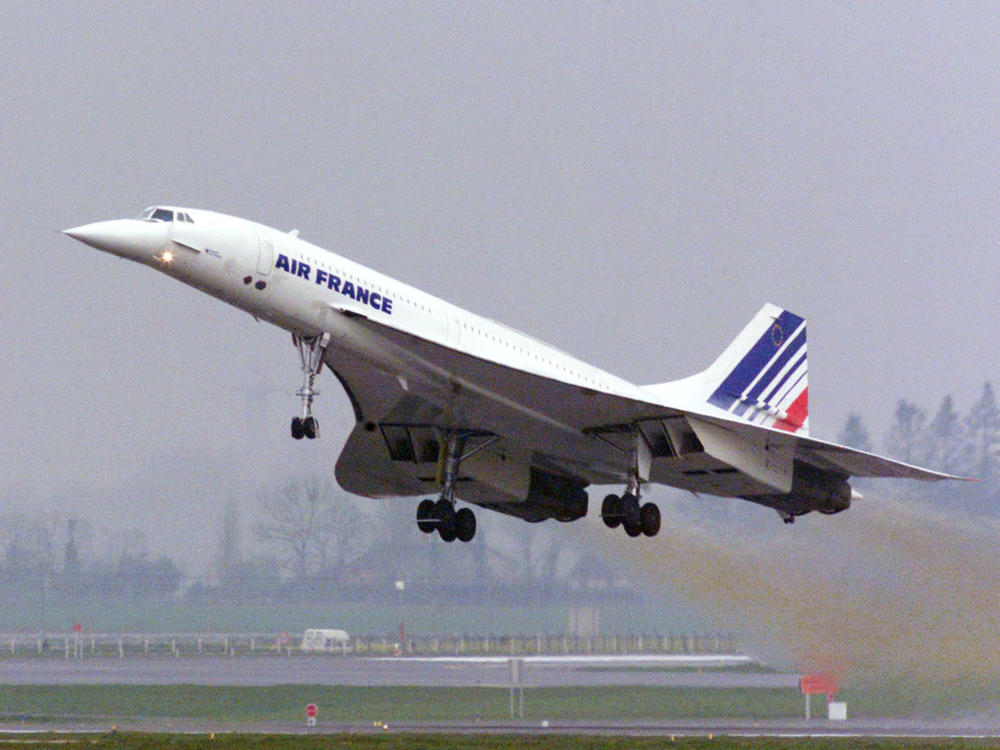Section Branding
Header Content
United Airlines Wants to Revive Supersonic Travel. But What About Climate Change?
Primary Content
United Airlines announced Thursday that it will purchase 15 supersonic airliners from a Denver-based startup that would fly 65 to 85 passengers at record speed.
Dubbed the Overture, the new aircraft from Boom Supersonic is designed to travel at 1.7 times the speed of sound, or about 1,300 mph, twice as fast as current airliners. That means it could complete transcontinental flights in roughly half the time.
"Boom's vision for the future of commercial aviation, combined with the industry's most robust route network in the world, will give business and leisure travelers access to a stellar flight experience," United CEO Scott Kirby said in a statement.
Boom expects to start building the Overture next year. After that, it will face several years of safety and flight testing before beginning United passenger flights in 2029, the companies said.
The fate of commercial supersonic flight has been in question ever since British Airways and Air France retired the ultrafast Concorde jet in 2003, citing sinking revenues and rising operational costs. The decision followed a 2000 crash in Paris of a chartered Air France Concorde that left 113 people dead.
Returning supersonic commercial planes to the air raises environmental questions
One big difference this time around is the world's focus on tackling climate change, and the aviation industry has faced scrutiny for its considerable carbon footprint.
Even among aircraft, supersonic jets are known for their unusually high emissions. They fly high in the atmosphere where the air is thinner and burn more fuel than traditional planes in order to reach their extreme speeds. As a result, the Concorde generated three times more of the greenhouse gas carbon dioxide than conventional planes, according to Climate Home News.
"A report from NASA earlier this year cited numerous environmental hazards of faster-than-sound commercial travel, although the paper did not examine specific designs such as Boom's," wrote David Slotnick, senior aviation business reporter for The Points Guy, an online travel publication.
Boom officials say the Overture will be able to fly on sustainable aviation fuels (SAF) and be the first commercial plane to immediately reach net-zero carbon emissions.
The company partnered with a new firm called Prometheus Fuels, which says its manufacturing process pulls carbon dioxide from the air in what is called "direct air carbon capture" and converts it into gasoline, diesel and jet fuel. Boom announced the partnership as it was developing its first "demonstrator" aircraft, the XB-1.
The method was discovered by German chemists in the 1920s, according to Science magazine, and is referred to as synthesizing gasoline. In the early 20th century, the process required coal, heat and pressure. Under its updated method, Prometheus says it uses water, air and electricity derived from renewable energy sources to make fuels.
Because the company pulls carbon dioxide from the air — and doesn't emit any greenhouse gases during the creation of its fuels — it greatly reduces the impact of any carbon emissions given off during the burning of its fuels.
The companies say multiple measures will make the plane carbon neutral - and recyclable
Additionally, Boom said it would use carbon offsets to make the XB-1 program carbon neutral. It has also vowed to design the Overture in a more efficient way so it requires less fuel, and to investigate how to make the aircraft as recyclable as possible so it can be repurposed at the end of its operational life.
"United and Boom share a common purpose—to unite the world safely and sustainably," said Boom founder and CEO Blake Scholl. "The world's first purchase agreement for net-zero carbon supersonic aircraft marks a significant step toward our mission to create a more accessible world."
Doug Vine, director of energy analysis at the Center for Climate and Energy Solutions, said more aircraft manufacturers and airlines are attempting to use sustainable fuel derived from things like recycled oil and biomass to reduce their greenhouse gas emissions and chart a course for their business that emphasizes sustainability.
"I think the aviation industry is very interested in doing this now," he said.
Vine added that such sustainability was possible so long as aircraft manufacturers and airlines could track how much carbon dioxide they removed from the atmosphere and how much they emitted.
"Sustainable aviation fuel is one of the pathways to limiting emissions growth in the industry," Vine said.
The Environmental Protection Agency recently took steps to regulate emissions by commercial aircraft, though the plan was met with skepticism by environmentalists.
In addition to carbon emissions generated by planes, advocates have also warned about the harmful effects of sonic booms on people and animals nearby.
Copyright 2021 NPR. To see more, visit https://www.npr.org.


